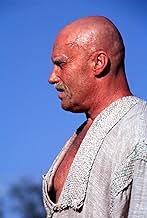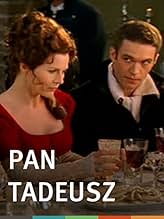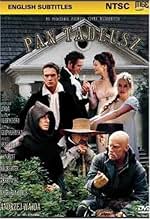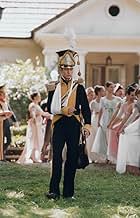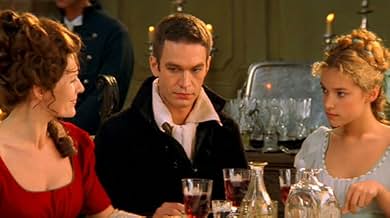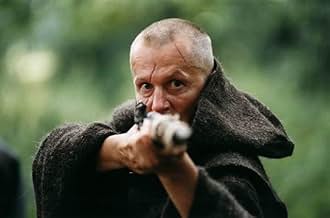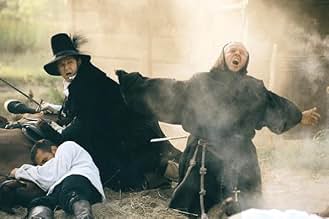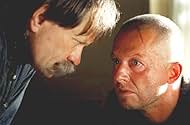Agrega una trama en tu idiomaIn the early 1810s, Poles, part of Russia's client state of Lithuania, think independence will come if they join forces with Napoleon when he invades Russia. This unity of purpose, in one di... Leer todoIn the early 1810s, Poles, part of Russia's client state of Lithuania, think independence will come if they join forces with Napoleon when he invades Russia. This unity of purpose, in one district, is undermined by two families, feuding since the head of one shot the head of the ... Leer todoIn the early 1810s, Poles, part of Russia's client state of Lithuania, think independence will come if they join forces with Napoleon when he invades Russia. This unity of purpose, in one district, is undermined by two families, feuding since the head of one shot the head of the other twenty years before. There are hopes of a reconciliation through a marriage of Pan T... Leer todo
- Dirección
- Guionistas
- Elenco
- Premios
- 7 premios ganados y 5 nominaciones en total
- Zosia Horeszkówna
- (as Alicja Bachleda-Curus)
- Rykow
- (as Siergiej Szakurow)
Opiniones destacadas
"Pan Tadeusz", the movie, is a costume drama directed by Andrzej Wajda, the Polish director with some notable previous work under his belt. Into this film he brings mainly his experience and routine as filmmaker. The acting, with few exceptions, fails to impress, the actors simply mill around and recite the splendid lines by Mickiewicz. The camera-work is passable, with some nice shots of the beautiful locations. Also scenography and costumes are decent. What stands out is the music by the renowned Wojciech Kilar. But then again, it is standing out against the backdrop of a, frankly, not very exciting movie.
All in all: the most interesting feature of this film is unfortunately lost in translation from rhymed verse in 19th century Polish.
Mickiewicz felt as a real Pole. This film is about the Polish nobilty in Soblicowo how they lead their normal lives - they party, hunt , go mushroom picking and fight with their neigbours. But everyone is waiting for Napolean, the French leader to liberate and save Poland. The director of this movie is famous Polish director. He is found in the imdb with more than 30 films of his career.
One of the most beloved literary works in the history of Polish History, "Pan Tadeusz" was never adapted to the screen before. The cinematography of this film is marvelously done. It demonstrates the beautiful fields of Lithuania, with its natural pictures.
The greatest part of the film was played by Daniel Olbrychski. He showed real emotion and a true actor. He is also a known actor in Europe, starring in films, in Poland, France and Russia.
I encourage everyone to see this film to learn some history and have some fun!
The actors are mainly well-known faces in Polish cinema and yet all rise above the stereotypical images many of the audience have of them. The greatest example of this is Boguslaw Linda as Robak the Priest. In the most moving scene in the film he gives the performance of his life.
The harmonious blend of Wajda's direction and Wojciech Kilar's score is a sensual feast. It is a film which impresses a profound sense of beauty to such an extent that one could appreciate the sheer art of the film without even having to understand the language (I cannot vouch for the quality of the sub-titles in English as I saw it in its original version).
If you only see one foreign language film this year, make sure it is this one.
The goals of watching being purely patriotic, the movie appeared to us as convincing, more to say, interesting from the very beginning. However, the experience of the movie was not merely a patriotic awareness that would truly be applied to a limited number of viewers but something much more, something I would like to share with other people no matter what nationality, upbringing, culture they are - a treasure that seems lost in most modern movies yet found in the great effort to craft cinematic productions based on classical literature. Certainly, it is a serious effort to adapt 1800s' romantic verses to the expectations of modern movie buffs...
"O Lithuania, my country, thou Art
like good health; I never knew till now
How precious, till I lost thee."
(translation by Kenneth R. Mackenzie)
That is how PAN TADEUSZ by Adam Mickiewicz begins, that is how PAN TADEUSZ by Andrzej Wajda ends and what is in between?
A great story of courage, love, sensation, uprising, honor, politics (in the times of Napoleon - a great hope for the partitioned Poland), confession and ... reconciliation: something classical, universal, touching, humane, pure and upright. One could indeed enumerate such adjectives... How does it work in practice? On the one hand, we have a particular focus on national identity and duty while, on the other hand, the emphasis is drawn upon particular characters. To view comes young Tadeusz Soplica (Michal Zebrowski) in love with two female characters: one is Zosia (Alicja Bachleda) – a 14-year-old girl of youthful, innocent joys; the other is Telimena (Grazyna Szapolowska) - a lady of extravagant behavior and tastes of luxury. In between come various characters, including impetuous Gerwazy (Daniel Olbrychski), young count-artist Horeszko (Marek Kondrat), and a humble priest Robak (Boguslaw Linda) who hides his secret till the very last hour of his life ...
The factor that goes with characters and, more specifically, the manner we perceive them is the strongest point of the movie: performances. Although the task to play the roles and say their lines in poem appears to be particularly difficult, most of the cast craft their performances with exceptional flair. It is thanks to them that we all may feel the story go on naturally. Daniel Olbrychski is magnificent as Gerwazy focusing on the aforementioned impetuosity, Boguslaw Linda can be referred to as 'convincing modesty', Ms Szapolowska says her lines with desirable elegance and Michal Zebrowski together with youthful Alicja Bachleda are a fine staff for the couple in love.
Since Mickiewicz payed particular attention to the descriptions of nature, the film does not skip this aspect. It can boast wonderful shots of the green fields, memorable clouds, returning storks, silent forests and beautiful sunsets. Being filmed in an artistic manner, it evokes a unique atmosphere and constitutes a sort of moving painting of idyllic landscapes. The narration by Adam Mickiewicz portrayed by Krzysztof Kolberger adds more importance to it providing the emotions of the author. The brilliant direction by Andrzej Wajda and the musical score by Wojciech Kilar supply a viewer with undeniable experience. Moreover, some scenes remain so intensely in the memory that any sensitive viewer (sensitive to art) will truly be absorbed by watching. Here, I would like to mention famous bear hunting, confession of Jacek Soplica and witty but elegant coffee making sequence. Just a pity there is not a famous mushroom picking tour described widely by Mickiewicz.
If you asked me what this movie means to me, my answer would be simple: an experience for eyes and soul, great cinema which returns after a period of absence, which returns like the upright storks that long for the sublimity of patriot's homeland.
¿Sabías que…?
- TriviaA polonaise composed by Kilar for this soundtrack gained a nation-wide recognition and became the opening tune for most high school proms. Before the movie the first dance was traditionally accompanied by Chopin.
- ConexionesReferenced in Poranek kojota (2001)
Selecciones populares
- How long is Pan Tadeusz: The Last Foray in Lithuania?Con tecnología de Alexa
Detalles
- Fecha de lanzamiento
- Países de origen
- Idioma
- También se conoce como
- Pan Tadeusz: The Last Foray in Lithuania
- Locaciones de filmación
- Oporów, Lódzkie, Polonia(castle)
- Productoras
- Ver más créditos de la compañía en IMDbPro
Taquilla
- Presupuesto
- PLN 12,500,000 (estimado)
- Tiempo de ejecución2 horas 27 minutos
- Color
- Mezcla de sonido
- Relación de aspecto
- 2.35 : 1
Contribuir a esta página


